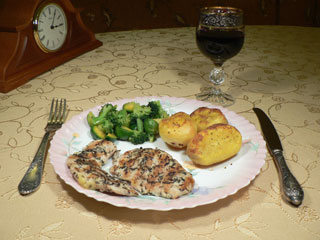
원글을 적은 분에 따르면, 초콜렛 캔디를 너무 좋아해서 대부분의 경우 3개를 먹어야 양이 차는 사람이었답니다. 근데, 어떤경우 2개를 먹고서 10-15분 정도 쉬게되면 더이상 먹고 싶은 욕망이 없어지는 (2개에 그냥 만족) 것을 발견하게 되었답니다. 왜 이런 경우가 발생하는지에 대해서 연구를 시작하게 되었다고 합니다. 이 연구는 "천천히 식사하는 효과"에 대해 많은것을 배우게 했습니다.
I like chocolate candies a lot. Most of the time I have to eat 3 candies to be totally pleased. But recently I noticed that if after two candies I take a 10-15 min pause, I have significantly less or even no desire at all to eat the third one. I started wondering why this happens and began my research, which turned into learning the effects of slow eating.
The most prominent benefit of eating slowly is reduced intake of food and, therefore, weight loss, which has its own health benefits like lowering blood pressure or arthritis prevention. Other positive moments of slow eating include:
1 First of all - It can't hurt you!
Slow eating rate doesn't have any negative effects on your health, but
can bring you a number of benefits without extra cost.
2 Appetite reduction
Eating slowly gradually reduces the appetite from the time you begin to
eat. It takes the brain about 15-20 minutes to start signaling feelings
of fullness. And if you have no appetite, you end up eating less.
3 Portion control
It is the direct sequence of the point #2. Slowly eating can make it much easier to eat less without feeling deprived. It takes some time to feel the fullness, so give this time to your body. Eating fast lets you eat too much before you are fully aware of it. Slowing the rate of eating can allow the satiety signals to develop before your plate is empty. (Guide to Behavior Change National Institutes of Health, National Heart, Lung, and Blood Institute (NHLBI))
4 Weight control
Points #2 and #3 turn into staving off extra pounds. Portion size and eating speed seem to be the part of the reason of famous “French paradox” -- the relatively low incidence of heart disease and overweight in France as compared to the United States, despite the generally high intake of calorie-rich foods and saturated fat. It is well documented[1] that the French take longer to eat than Americans despite French eat smaller portions. Recently Japanese researches found strong positive correlation between rate of eating and body mass index (BMI) and obesity[2-3].
5 Digestion
It is well known that digestion begins in the mouth, where the saliva is mixed with the food and starts to break it down into smaller chemicals that can be absorbed and nourish the body. Chewing food thoroughly promotes smooth, complete digestion. Basically the slower you eat the faster and more efficiently you metabolize the food. When food is swallowed whole it makes it more difficult for the body to absorb all the important nutrients (e.g vitamins, minerals, and amino acids).
6 Taste and enjoy your food!
When you eat slowly, you end up tasting your food more. Eating slowly lets you experience more of the flavors, textures and smells of the food you eat. Your food will become more interesting. And again, French experience. They focus more on the impression and less on the health effects of eating.
7 Quality versus Quantity
Slow eating may become a small step to a more healthy diet. If you won't like what you eat when you eat it slowly, probably the next time you will choose something of a better quality and enjoy the pleasures of good food. Fast eaters are more prone to consume "junk" and "fast" foods.
8 Insulin resistance
Japanese researches found[4] that eating fast is associated with insulin resistance. Insulin resistance is a silent condition that increases the chances of developing diabetes and heart disease. Also, fast eating seems to be a risk factor for the metabolic syndrome[5] (combination of the symptoms such as high blood pressure, obesity, high cholesterol, and insulin resistance).
9 Heartburn & Gastroesophageal reflux
Rapid eating may cause acid reflux[6]. It may be especially true for people suffering from GERD (Gastroesophageal Reflux Disease).
Sources & References
- 1. Rozin P, Kabnick K, Pete E, Fischler C, Shields C. The ecology of eating: smaller portion sizes in France Than in the United States help explain the French paradox. Psychol Sci. 2003 Sep;14(5):450-4. PubMed
- 2. Otsuka R, Tamakoshi K, Yatsuya H, Murata C, Sekiya A, Wada K, Zhang HM, Matsushita K, Sugiura K, Takefuji S, OuYang P, Nagasawa N, Kondo T, Sasaki S, Toyoshima H. Eating fast leads to obesity: findings based on self-administered questionnaires among middle-aged Japanese men and women. J Epidemiol. 2006 May;16(3):117-24. PubMed
- 3. Sasaki S, Katagiri A, Tsuji T, Shimoda T, Amano K. Self-reported rate of eating correlates with body mass index in 18-y-old Japanese women. Int J Obes Relat Metab Disord. 2003 Nov;27(11):1405-10. PubMed
- 4. Otsuka R, Tamakoshi K, Yatsuya H, Wada K, Matsushita K, Ouyang P, Hotta Y, Takefuji S, Mitsuhashi H, Sugiura K, Sasaki S, Kral JG, Toyoshima H. Eating fast leads to insulin resistance: Findings in middle-aged Japanese men and women. Prev Med. 2007 Aug 3 PubMed
- 5. Kral JG, Buckley MC, Kissileff HR, Schaffner F. Metabolic correlates of eating behavior in severe obesity. Int J Obes Relat Metab Disord. 2001 Feb;25(2):258-64. PubMed
- 6. Wildi SM, Tutuian R, Castell DO. The influence of rapid food intake on postprandial reflux: studies in healthy volunteers. Am J Gastroenterol. 2004 Sep;99(9):1645-51. PubMed
- 7. Johnson JB, Laub DR, John S. The effect on health of alternate day calorie restriction: eating less and more than needed on alternate days prolongs life. Med Hypotheses. 2006;67(2):209-11. Epub 2006 Mar 10. PubMed
'삶 > 좋은생활도움글' 카테고리의 다른 글
| 지름신을 물리칠수 있는 WEALTH 방법론 (5) | 2009.08.16 |
|---|---|
| 동네 치킨 가격이 다른이유는 닭의 상태 - 냉장닭인지 구분하는 방법 (4) | 2009.06.23 |
| 황수관 박사의 33가지 가르침 (18) | 2009.05.11 |


